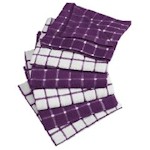 |
|
|
| ||||||
|
 |
DII Everyday Kitchen Basic Windowpane Combo Dish Cloth Set of 6, EggplantPrice: $7 |
| Review
of
DII Everyday Kitchen Basic Windowpane Combo Dish Cloth Set of 6, Eggplant, made by
DIIm (You can print this review in landscape mode, if you want a hardcopy) Reviewer: Mark Lamendola My first requirement for any cloth-type material used in the kitchen is that it is made from natural fibers. These dish cloths are made from 100% cotton. I absolutely will not use polyester in the kitchen (or wear it), because when polyester melts on skin it actually melts into the skin and that can make a very serious burn out of what would otherwise be a very minor burn. Polyester is also prohibited apparel in electrical work for this same reason. The polyester people now call their dangerous product "microfiber" in hopes people won't notice. Do not use microfiber towels in the kitchen. Not all cotton cloth is the same. In fact, there are wide variations in quality. When I look at a cotton cloth, I test its weight and examine the weave. This is a very light weight fabric, almost like a cheesecloth. You can easily see through these dish cloths when holding them up to a light. These are not "very absorbent" as claimed. There's just not enough material per square inch for that purpose. I tried drying a few wet dish items, and these simply did not do the job. But I don't think that's the job they are intended to do. The same properties make these good for washing the dishes, thus "dish cloth" rather than "dish towel" in the name. Another test of a material is how well it recovers from wadding. I wadded a couple of wet cloths and a couple of dry ones. I think there's not enough material per square inch to give these any real "body." So they score well on wadding: no wrinkles. Each towel is also hemmed all the way around, and I checked out that stitching very closely. It's a "straight stitch," nothing fancy. But nothing fancy is needed. Unfortunately, the stitching on three of the six towels appears to be already coming apart (stray threads sticking out, but maybe these aren't part of the actual stitch--hard to tell). So I doubt the "long-wearing" claim. These cloths are attractive. They look nice in the kitchen. They can come in handy as general use cloths for wiping the countertop, glass stove top, dining table, etc. The soft cotton won't scratch a surface (as long as you wash these properly, which means use less than 20% of the recommended laundry detergent and don't use one containing wood pulp). The low density of the material means quick drying times. A couple of tips on the care for these.
| |
| |||||